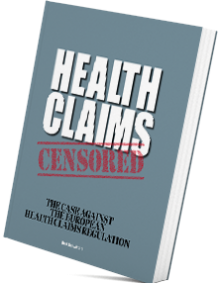13 March 2013
Dutch version available
“Everyone has the right freely to participate in the cultural life of the community, to enjoy the arts and to share in scientific advancement and its benefits.”
This is the human right laid down in Article 27 of the Universal Declaration of Human Rights (UDHR). In the European Union, the human right to share in the benefits of scientific advancement in the field of health and nutrition is seriously compromised by the Nutrition and Health Claims Regulation. Advancements made in nutritional science and the benefits produced by foods and foodstuffs may no longer be shared with consumers by those who procure the foods and foodstuffs.
The EU legislature has determined that all scientific advancement as well as all the ensuing benefitsmust a priori be disqualified as misleading and therefore prohibited. The benefits may only be shared in when authorized and legalized by the legislator. It is a watertight system described as the “ex ante control of the veracity of nutrition and health claims.” Ex ante of what ? Ex ante of sharing in them.
Curtailing humans in their sharing in the benefits of scientific advancement is routinely misrepresented as serving a high level of health and consumer protection. In this mindset, the highest level of protection is attained by applying the highest standard of verification. At the highest level of protection (precautionary principle), we find the lowest level of sharing in (ex ante control).
This is precisely the precautionary level of “sharing in” we find in the List of Legalized and ex antecontrolled Health Claims, issued by the European Commission on 16 May 2012. In the name of protecting consumers against misleading health claims, the entire body of scientific advancement in the field of human health and nutrition – which can easily fill a library of a reputable University – was reduced to 222 “health benefits” that consumers may share in. That calcium is good for our bones is now etched in law.
In the field of nutrition and health, information becomes knowledge when the actual use of a product confirms or fails to confirm the benefits claimed in its intended normal use. Until the arrival of the European Health Claims Regulation, the sharing of and in scientific advancement and its benefits took place between producers and consumers. The benefits of scientific advancement were exchanged with consumers in the form of food-products and the commercial communication that accompanied them.
Traditionally, consumers learned about health by using products, not by reading scientific journals, newspapers, magazines, books or websites. Consumers instinctively know that the proof of the pudding is in the eating. In the European Union, the proof of the pudding is no longer in the eating. Since 2006, it is in the minds of “proof of the pudding” assessors (policy advisors) and “proof of the pudding” managers (policy makers).
In the European Union, where the sharing in scientific advancement has been placed under the absoluteex ante control of the legislator, consumers now find themselves at the mercy of politicians, policy advisers and consumer advocates, who have no qualms to censor scientific advancement and its benefits in accordance with their own ideological, political and idiosyncratic preferences. Their unshakable belief is that they have the right to control and curtail the human right to share in scientific advancement and its benefits. Their belief is that they have the right to violate Article 27 of the UDHR. Their standard excuse for violating Article 27 of the UDHR is that they serve the “public interest” and provide a high level of protection for the curtailed.
True and unalienable rights cannot collide or be in conflict with each other. The right to protect oneself against scientific advancements misleadingly presented as benefits does not conflict with the right to share in such advancements. In fact, the right to share in the advancements precedes the right to seek protection, simply because one can only seek protection after having found that the advancements one shared in were misleadingly presented as benefits. So it is, that fundamentally and when exerted by the original owners, these two rights do not collide with, but complement each other.However, the right to share in the benefits of scientific advancement and the right to protect oneself against misleading information do collide when the State interferes by usurping them and then acts in loco and ex ante as the exclusive sharer in scientific advancement and the exclusive seeker of protection. In addition to this, the State exerts a monopoly on the power to authorize (“legalize”) scientific advancement and provide protection. This is how the State holds in one hand the positions of “sharer in” and “legalizer” of scientific advancement, and of “seeker” and provider of protection.
This enables the State, in casu the European Union, to use the usurped right to seek protection and the power to provide it in combination with the power to authorize scientific advancement, to limit (control) the sharing in scientific advancement. As a result of the Health Claims Regulation, consumers – also known as humans – find themselves destitute of the rights they considered unalienable. And, as a result of that same Regulation, they also find themselve destitute of scientific advancement and its benefits.
Bert Schwitters




